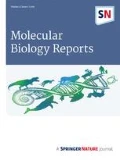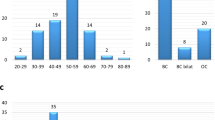Abstract
Breast cancer is currently the most common form of malignant tumour in womenboth in the Czech Republic and in most countries of the western world, and its incidence is constantly increasing. Many risk factors are known to play a major role in the development of this form of cancer. One of them is genetics, especially the BRCA1/2 genes. A higher risk of ovarian cancer is also associated with these genes. With the development of laboratory diagnostics massive parallel sequencing methods (NGS) are now routinely employed, enabling the detection of other pathogenic sequence variants, or variants of uncertain significance (VUS) not previously detected. Besides the high penetrance BRCA1/2 genes, medium and low penetrant genes also come to the fore. There were 2046 probands examined in the study, men and women, mainly from eastern part of the Czech Republic. These were selected for a genetic examination, after meeting indication criteria (probands from high-risk families or with breast or ovarian cancer). From this group only women, 2033 probands, were selected and were given a genetic examination for the possible presence of patogenic sequence variants in BRCA1/2 genes, or other candidate genes. Analyses were conducted in the laboratory using DHPLC or next generation sequencing. MLPA method is used for large rearrangements in genes. From all examined women 212 mutations were detected. The most mutations (128) were found in the BRCA1 gene (60%). In the BRCA2 gene 71 mutations (34%) were found and 13 more mutations (6%) were detected in another candidate genes (CHEK2, PALB2, ERCC4). The most frequent sequence variant was c.5266dupC in the BRCA1 gene. The results show that 72% of women with a confirmed mutation in the BRCA1 gene and 77.5% of women with the sequence variant BRCA2, already had breast cancer and 16.4% of women with BRCA1 and 7% of women with BRCA2 already had ovarian cancer. Only 21 high risk families used the possibility to be tested and had undergone targeted mutation testing. The study results suggest a reflection of the causes and needs for examination of patients and women predisposed to breast or ovarian cancer.
Similar content being viewed by others
References
Shiovitz S, Korde LA (2015) Genetics of breast cancer: a topic in evolution. Ann Oncol 26:1291–1299. https://doi.org/10.1093/annonc/mdv022
Economopoulou P, Dimiridias G, Psyrri A (2015) Beyond BRCA: New hereditary breast cancer susceptibility genes. Cancer Treat Rev 41(1):1–8. https://doi.org/10.1016/j.ctrv.2014.10.008
Svod (2005). Accessed 17 September 2019. ISSN 1802–8861. https://www.svod.cz/
Kim Y, Yoo KY, Goodman MT (2015) Differences in Incidence, Mortality and Survival of Breast Cancer by Regions and Countries in Asia and Contributing Factors. Asian Pac J Cancer Prev 16:2857–2870. https://doi.org/10.7314/apjcp.2015.16.7.2857
Thakur P, Seam RK, Gupta MK, Gupta M, Sharma M et al (2017) Breast cancer risk factor evaluation in a Western Himalayan state: a case–control study and comparison with the Western World. South Asian Journal of Cancer 6:106–109. https://doi.org/10.4103/sajc.sajc_157_16
Zenhendel M, Niakan B, Keshtkar A, Rafiei E, Salamat F (2018) Subtypes of benign breast disease as a risk factor for breast cancer: a systematic review and meta-analysis protocol. Iran J Med Sci 43:1–8
Laamiri FZ, Bouayad A, Hasswane N, Ahid S, Mrabet M et al (2015) Risk factors for breast cancer of different age groups: moroccan data. Open J Obstet Gynecol 05:79–87. https://doi.org/10.4236/ojog.2015.52011
Momenimovahed Z, Salehiniya H (2019) Epidemiological characteristics of and risk factors for breast cancer in the world. Breast Cancer 11:151–164
Shandiz FH, Talasaz ZH (2017) The relationship between breast cancer and air pollution: review article. Review Clinical Medicine 4:136–139. https://doi.org/10.22038/RCM.2017.9258
Machackova E, Foretova L, Lukesova M, Vasickova P, Navratilova M et al (2008) Spectrum and characterisation of BRCA1 and BRCA2 deleterious mutations in high-risk Czech patients with breast and/or ovarian cancer. BMC Cancer 8:140. https://doi.org/10.1186/1471-2407-8-140
Lukesova M, Machackova E, Vasickova P, Navratilova M, Pavlu H et al (2006) Výsledky testování BRCA1 a BRCA2 genů Masaryova onkologického ústavu. Klin Onkol 19:55–57
Buys SS, Sandbach JF, Gammon A, Patel G, Kidd J et al (2017) A study of over 35,000 women with breast cancer tested with a 25-gene panel of hereditary cancer genes. Cancer 123(10):1721–1730. https://doi.org/10.1002/cncr.30498
Lincoln SE, Kobayashi Y, Anderson MJ, Yang S, Desmond AJ et al (2015) A Systematic Comparison of Traditional and Multigene Panel Testing for Hereditary Breast and Ovarian Cancer Genes in More Than 1000 Patients. J Mol Diagn 17(5):533–544. https://doi.org/10.1016/j.jmoldx.2015.04.009
Tung N, Lin NU, Kidd J, Allen BA, Singh N et al (2016) Frequency of Germline Mutations in 25 Cancer Susceptibility Genes in a Sequential Series of Patients With Breast Cancer. J Clin Oncol 34(13):1460–1468. https://doi.org/10.1200/JCO.2015.65.0747
Mavaddat N, Pharoah PDP, Michailidou K, Tyrer J, Brook MN et al (2015) Prediction of Breast Cancer Risk Based on Profiling With Common Genetic Variants. JNCI: Journal of the National Cancer Institute 107(5):1–15. https://doi.org/10.1093/jnci/djv036
Janatova M, Borecka M, Soukupova J, Kleiblova P, Stribrna J et al (2016) PALB2 as another candidate gene for genetic testing in patients with hereditary breast cancer in Czech Republic. Klinická onkologie 29:S31–S34. https://doi.org/10.14735/amko2016S31
Molina-Montes E, Perez-Nevot B, Pollan M, Sanchez-Cantalejo E, Espin J et al (2014) Cumulative risk of second primary contralateral breast cancer in BRCA1/BRCA2 mutation carriers with a first breast cancer: A systematic review and meta-analysis. The Breast 23(6):721–742. https://doi.org/10.1016/j.breast.2014.10.005
Assi HA, Khoury KE, Dbouk H, Khalil LE, Mouhieddine TH et al (2013) Epidemiology and prognosis of breast cancer in young women. Thorac Dis 5(S1):S2–S8
Genetika – Biologie (2010). Accessed 17 September 2019. https://www.genetika-biologie.cz/hereditarni-nadorove-syndromy
Suter N, Ray RM, Hu JW, Li MG, Porter P et al (2004) BRCA1 and BRCA2 mutations in women from Shanghai China. Cancer Epidemiol Biomarkers Prev 13:181–189
Yang X, Hu Z, Wu J, Liu G, Shen Z et al (2015) Breast cancer in BRCA1 or BRCA2 mutation carriersin Chinese Han population. China oncol 4:247–252
Yao L, Sun J, Zhang J, He Y, Ouyang T et al (2016) Breast cancer risk in Chinese women with BRCA1 or BRCA2 mutations. Springer 156:441–445
Zhang X, Wang X, Song B, Shao K, Li G et al (2019) Gene panel sequencing in a Chinese high-risk breast cancer cohort. bioRxiV. https://doi.org/10.1101/513317
Mavaddat N, Peock S, Frost D, Ellis S, Platte R et al (2013) Cancer risks for BRCA1 and BRCA2 mutation carriers: results from prospective analysis of EMBRACE. JNCI 11:812–822. https://doi.org/10.1093/jnci/djt095
Brohet RM, Velthuizen ME, Hogervorst FBL, Meijers-Heijboer HEJ, Seynaeve C et al (2013) Breast and ovarian cancer risks in a large series of clinically ascertained families with a high proportion of BRCA1 and BRCA2 Dutch founder mutations. J Med Genet. https://doi.org/10.1136/jmedgenet-2013-101974
Kuchenbaecker KB, Hopper JL, Barnes DR, Phillips KA, Mooij TM et al (2017) Risks of breast, ovarian and contralateral breast cancer for BRCA1 and BRCA2 mutation carriers. JAMA 23:2402–2413. https://doi.org/10.1001/jama.2017.7112
Tinelli A, Malvasi A, Leo G, Vergara D, Pisano M et al (2010) Hereditary ovarian cancers: from BRCA mutations to clinical management A modern appraisal. Cancer Metastasis Rev 29:339–350
Russo A, Calò V, Bruno L, Rizzo S, Bazan V, Di Fede G (2009) Hereditary ovarian cancer. Crit Rev Oncol Hematol 69:28–44
Jakimovska M, Kostovska IM, Popovska-Jankovic K, Kubelka-Sabit K, Karadjozov M et al (2018) BRCA1 and BRCA2 germline variants in breast cancer patients from the Republic of Macedonia. Breast Cancer Res Treat 168:745–753. https://doi.org/10.1007/s10549-017-4642-5
Park B, Dowty JG, Ahn CH, Win AK, Kim SW et al (2015) Breast cancer risk for Korean women with germline mutations in BRCA1 and BRCA2. Springer 152:659–665
Wang X, Liu H, Maimaitiaili A, Zhao G, Li S et al (2019) Prevalence of BRCA1 and BRCA2 gene mutations in Chinese patients with high-risk breast cancer. Mol Genet Genomic Med 7:e677. https://doi.org/10.1002/mgg3.677
Hung FH, Wang YA, Jian JW, Peng HP, Hsieh LL et al (2019) (2019) Evaluating BRCA mutation risk predictive models in a Chinese cohort in Taiwan. Scientific Reports 9:10229. https://doi.org/10.1038/s41598-019-46707-6
van Der Looij M, Wysocka B, Brozek I, Jassem J, Limon J et al (2000) Founder BRCA1 mutations and two novel germline BRCA2 mutations in breast and/or ovarian cancer families from North-Eastern Poland. Hum Mutat 15(5):480–481. https://doi.org/10.1002/(SICI)1098-1004(200005)15:5%3c480:AID-HUMU13%3e3.0.CO;2-G
Gorodetska I, Serga S, Lahuta T, Ostapchenko L, Demydov S et al (5382insC) Prevalence of two BRCA1 mutations, 5382insC and 300T %3e G, in ovarian cancer patients from Ukraine. Fam Cancer 16(4):471–476. https://doi.org/10.1007/s10689-017-9978-9
LaraquiI A, Uhrhammer N, El Rhaffouili H, Sekhsokh Y, Lahlou-Amineet I et al (2015) BRCA genetic screening in Middle Eastern and North African: Mutational Spectrum and Founder BRCA1 Mutation (c.798_799delTT) in North African. Dis Markers 2015:1–8. https://doi.org/10.1155/2015/194293
Ashton-Prolla P, Vargas FR (2014) Prevalence and impact of founder mutations in hereditary breast cancer in Latin America. Genetics and Molecular Biology 37:234–240
Puchmajerova A, Tornikidis J, Mrna L, Havlovicova M, Vlckova M et al (2018) Hereditární formy karcinomu prsu: genetická etiologie a současné možnosti prevence a chirurgické léčby. Časopis lékařů českých 157:90–95
Acknowledgements
I would like to thank the Agel Laboratory for providing research data. I would also like to thank the Faculty of Medicine in Ostrava for their financial support in the professional translation of this article. This article was created with the support of the SGS09 / LF / 2019 project.
Funding
This study was supported by a Student grant competition from Faculty of Medicine, University of Ostrava, Czech Republic (SGS09/LF/2019).
Author information
Authors and Affiliations
Corresponding author
Ethics declarations
Conflict of interest
The authors declare that they have no conflict of interests.
Ethical approval
All procedures performed in studies involving human participants were in accordance with the ethical standards of the institutional and/or national research committee and with the 1964 Helsinki declaration and its later amendments or comparable ethical standards.
Informed consent
Informed consent was obtained from all individual participants included in the study.
Consent to participate
This study is approved by Ethic committee of Nový Jičín Hospital in the Czech Republic.
Additional information
Publisher's Note
Springer Nature remains neutral with regard to jurisdictional claims in published maps and institutional affiliations.
Rights and permissions
About this article
Cite this article
Riedlova, P., Janoutova, J. & Hermanova, B. Frequency of mutations in BRCA genes and other candidate genes in high-risk probands or probands with breast or ovarian cancer in the Czech Republic. Mol Biol Rep 47, 2763–2769 (2020). https://doi.org/10.1007/s11033-020-05378-7
Received:
Accepted:
Published:
Issue Date:
DOI: https://doi.org/10.1007/s11033-020-05378-7




